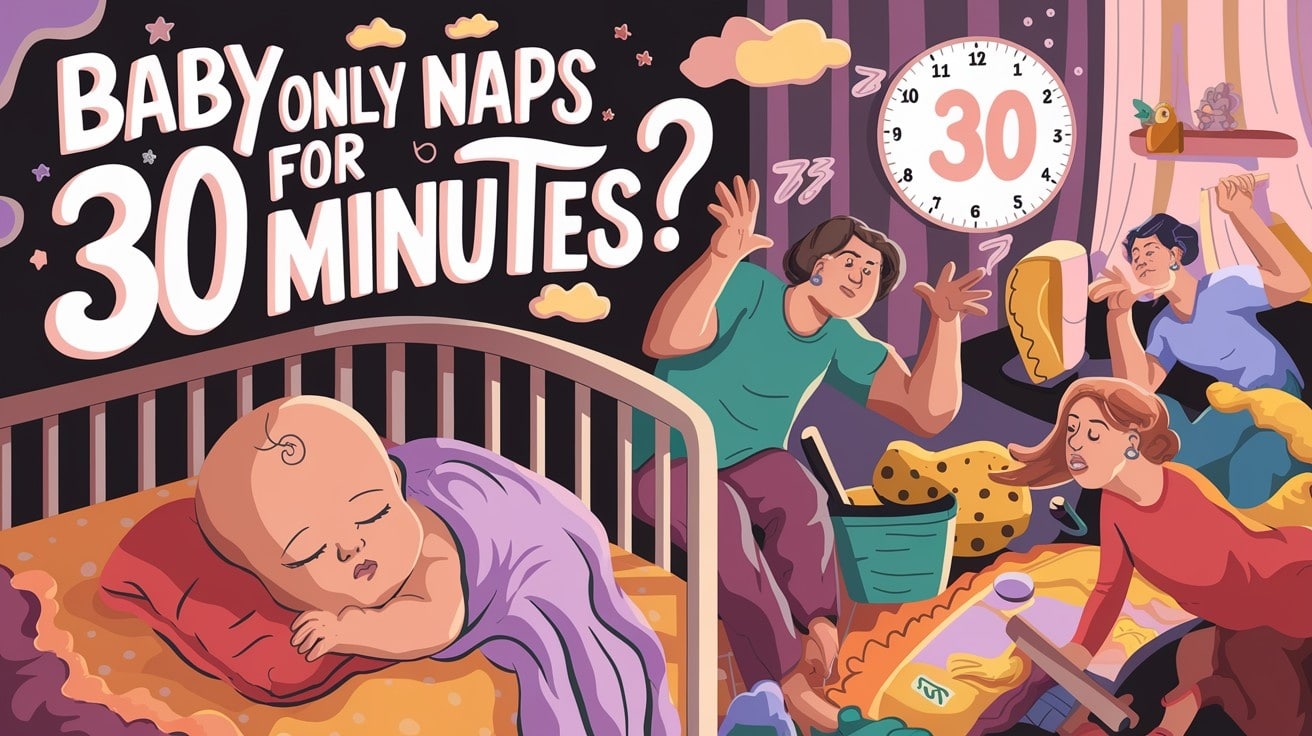
The midnight shuffle between crib and arms becomes life’s defining rhythm when your newborn refuses to sleep more than 30 minutes at a stretch.
Parents of one-month-olds everywhere share the same bleary-eyed question: “Is this normal?”
Those brief sleep cycles are actually perfectly natural for newborns. Did you know babies spend about 50% of their sleep in active REM sleep compared to an adult’s 20%? This biological difference explains much of their frequent waking.
The exhaustion is real, but solutions exist. Understanding your baby’s unique sleep patterns, creating gentle routines, and managing your expectations can change these challenging early weeks.
Rest assured, you’re not alone in this expedition. With time and patience, those precious 30-minute catnaps will gradually become the longer stretches of sleep you’re dreaming about.
Why One-Month-Olds Cat-Naps?
One-month-old babies typically have short sleep cycles lasting only 30-45 minutes because their sleep patterns are still developing.
Their underdeveloped circadian rhythm makes it difficult to distinguish between day and night, as their bodies are still learning to respond to environmental cues. Hunger often interrupts sleep since newborns have tiny stomachs that empty quickly, and some may experience feeding challenges like difficulty latching or reflux.
Simple discomforts such as wet diapers, room temperature issues, or being swaddled too tightly can also wake your baby, along with common newborn conditions like reflux or gas pains.
Remember that these short sleep periods are normal developmental phases that will gradually improve as your baby grows.
Normal Sleep Patterns for One-Month-Old Babies

One-month-old babies typically sleep 14-17 hours per day, but this is broken into short intervals of 2-3 hours. This fragmented pattern is completely normal and developmentally appropriate.
What Pediatricians Consider Normal: Newborns have yet to develop their circadian rhythms. Their sleep is distributed throughout the day and night, with frequent wakings for feeding. Most babies at this age will wake every 2-4 hours to eat, regardless of day or night. This biological necessity ensures they receive adequate nutrition for their rapid development.
Day vs. Night Sleep Behavior: Many newborns have their days and nights confused initially. This typically resolves by 2-3 months as their internal clock develops and they begin distinguishing between daylight and darkness hours.
When to Contact Your Doctor: While variable sleep patterns are expected, certain signs warrant medical attention: sleeping too much and being difficult to wake for feedings, extreme fussiness despite comfort measures, or dramatic changes in established patterns.
How to Help a One-Month-Old Sleep Longer than 30 Minutes?
Establish a consistent sleep routine with dimming lights and gentle rocking 15 minutes before sleep to signal rest time to your baby’s developing brain.
Create an ideal sleep environment by keeping the nursery cool (68-72°F) with blackout curtains and a firm mattress with just a fitted sheet for safety. Try cluster feeding in the evening and consider dream feeding before you sleep to extend your baby’s longest sleep stretch.
Proper swaddling prevents startling reflexes, while white noise masks household sounds and mimics the womb’s familiar whooshing.
Special tip: Gently stroke downward between the baby’s eyebrows to naturally encourage their eyelids to close when drowsy but fighting sleep. This subtle touch often works like magic when all else fails.
Common Causes of Short Sleep Bursts in a 1-Month-Old
Sleep in newborns is often fragmented, with short sleep bursts being completely normal at this age. Gas and colic can cause significant discomfort, making it difficult for babies to stay asleep for extended periods.
Their immature digestive systems often lead to trapped gas, resulting in fussiness and abrupt wake-ups. Overtiredness paradoxically makes it harder for babies to sleep well.
When a newborn misses its sleep window, stress hormones increase, making it difficult for the newborn to settle and stay asleep. This creates a frustrating cycle of exhaustion and poor sleep.
Sleep associations develop early, with many babies needing specific conditions to fall back asleep. Environmental factors like excessive light, noise, or stimulation can easily disrupt a newborn’s sensitive sleep patterns.
The most common cause of short sleep bursts in one-month-olds is their naturally immature sleep cycle, which is designed for frequent feeding and proximity to caregivers.
Caring for Yourself When Baby Won’t Sleep

When sleep deprivation hits during those early parenting days, remember that self-care isn’t selfish—it’s essential.
Take advantage of your baby’s nap times for power naps, even if just for 20 minutes.
Don’t hesitate to build and utilize your support system. Ask trusted family members or friends to watch the baby while you catch some uninterrupted sleep. Set realistic expectations for this season of life.
Your home doesn’t need to be spotless, and you don’t need to cook elaborate meals.
Remember that this challenging phase is temporary. Your baby will eventually develop more consistent sleep patterns, even when it feels like sleepless nights will last forever.
Practice mindfulness when you’re feeling overwhelmed—take deep breaths and focus on the present moment. The greatest gift you can give your baby is a parent who’s taking care of their well-being, too.
When to Talk to a Pediatrician?

While many childhood issues resolve on their own, certain signs warrant medical attention. Contact your pediatrician if you notice poor weight gain, difficulty feeding, or persistent crying that doesn’t respond to comfort measures.
For reflux symptoms, seek help when your baby experiences forceful vomiting, refuses to feed, or shows signs of pain during or after meals. These could indicate a condition requiring medical intervention.
Potential allergic reactions, such as rashes, breathing difficulties, or digestive problems, should never be ignored.
Even mild symptoms can sometimes signal serious underlying conditions.
Trust your parental instinct. If something feels wrong despite reassurances, request an appointment. Pediatricians understand that you know your child best.
Remember that regular wellness visits are also essential for tracking development, even when your child appears healthy. Early intervention often leads to better outcomes for treatable conditions.
Summing It Up
You’re not alone in the short nap struggle. Many parents face the challenge of a one-month-old who wakes after just 30 minutes of sleep. Remember that your baby’s sleep patterns are still developing at this stage.
Their circadian rhythm is just beginning to form, and short naps are developmentally normal.
Consistency in your approach will gradually help extend those sleep periods. Create a calm sleep environment and watch for sleepy cues to optimize nap timing.
Be patient with yourself and your little one during this temporary phase. With time and gentle guidance, your baby will naturally begin to connect sleep cycles and take longer naps.
The most important thing is responding to your baby’s needs while gradually encouraging healthy sleep habits that will benefit them for years to come.
If you’re interested in more informational content on mothers and babies, feel free to click here and explore other blogs that you might enjoy.
Frequently Asked Questions (FAQs)
1. Can Overstimulation During the Day Affect My Baby’s Nap Length?
Yes, too much noise, activity, or light can overwhelm a newborn’s nervous system, making it harder to settle into longer naps.
2. Should I Keep My Baby Awake Longer During the Day to Improve Night Sleep?
No, overtired babies usually sleep worse—shorter naps and more frequent night-wakings are common.
3. Could My Baby’s Short Naps Be Linked to A Growth Spurt?
Yes, growth spurts can temporarily disrupt sleep as babies feed more often and experience physical changes.
4. Do Newborns Need Complete Silence to Nap Well?
Not necessarily—white noise or soft ambient sounds can actually help babies sleep by mimicking the womb environment.
